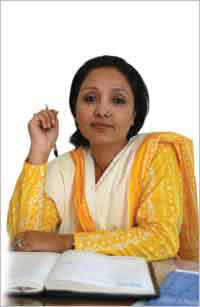 Lily Thapa was something of a child prot?g?: at 13 she finished school, was 17 when she graduated from college and went on to become one of the youngest master's students at Delhi University. But her family asked her to return home because her dying father, an ex-major general, wished to see his eldest daughter married.
Lily Thapa was something of a child prot?g?: at 13 she finished school, was 17 when she graduated from college and went on to become one of the youngest master's students at Delhi University. But her family asked her to return home because her dying father, an ex-major general, wished to see his eldest daughter married. Lily put her studies on hold and was married to a medical doctor in the army. She juggled motherhood to complete her master's in sociology from Padma Kanya in Kathmandu. But her real education was about to begin. Widowed at 32 after her husband died of a heart attack while on peacekeeping duty in Iraq, she suddenly faced society's stigma. Friends and family edged Lily out. "For the first time in my life, I felt lonely and ostracised," recalls Lily, her old pain evident in her voice.
But Lily didn't let this demoralise her, or make her bitter. She chose to confront head-on the social stigma that Nepali society attaches to widows. She launched a support group for women who have lost their husbands. "We always ended up crying because we shared the same pain. We were living satis, burnt on the inside," she says.
It took a while for Lily to realise that society would offer neither pity nor sympathy. The widows would have to unite and help each other with financial independence and spiritual strength. Women for Human Rights was set up in 1994 and has been providing skills training and savings and credit schemes for women to set up small businesses. The group is now active in 20 districts and nearly 700 single women beneficiaries have formed their own groups.
Pramila Nepal is a 24-year-old from Sindhupalchok who heads a group of 24 other young widows like herself. "Lily didi changed my life when I had lost all hope," she says. Pramila is among those working in a pressure group to ensure that women widowed by Maoists and the security forces receive compensation in their own name, reversing a growing trend of other relatives claiming compensation. "If it had not been for Lily, my children would not have money saved up for their future," says 25-year-old Pramila Mandal from Siraha, whose husband, a policeman, was killed by Maoists.
Lily now considers her crusade against widow discrimination her life's mission. She says: "All we want to do is to spread self-reliance and hope so that single women can help themselves and their families."
(Naresh Newar)


